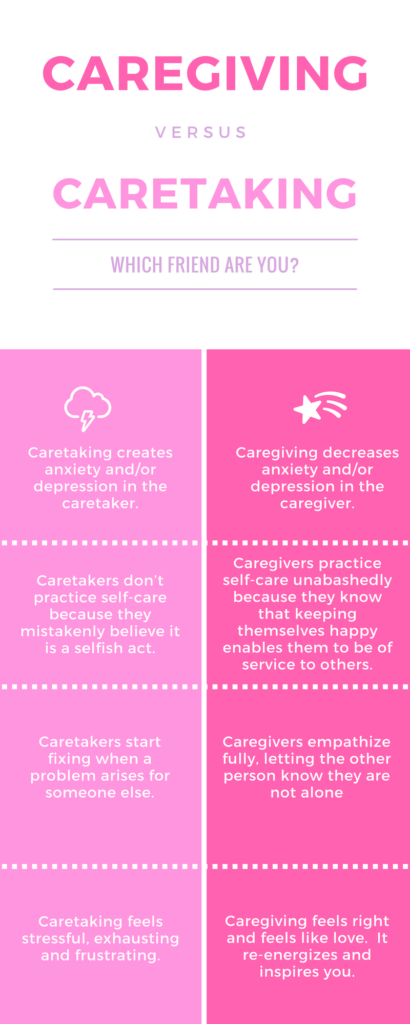Many people are lucky enough to have a “responsible friend” – the one who organizes day trips, volunteers to be designated driver, and makes sure everyone’s hydrated after a night of drinking. This friend could be a natural caretaker or a caregiver.

The two may sound the same, but there’s a sharp difference when you look closer. Counselor Elizabeth Kupferman says, “I view caretaking and caregiving on a continuum. We usually aren’t doing both at the same time.”
A caregiver is someone who’s happy to help when asked. She does favors because she wants to. Caregiving is an expression of kindness and love.
Caretaking, on the other hand, comes from a less happy and secure place. A caretaker will often cast herself into situations out of self-imposed obligation and a need to be in control.
She’s frequently disgruntled about putting the needs of others before her own, but feels she doesn’t deserve to be a priority. Instead, she’s likely to keep her mouth shut and let the resentment build because she’s conditioned to living this way.
If you sense that your form of caring may be the latter, it’s important that you examine the reason why you’re like this. Not only is it not always good for your friendships, it’s not good for you – and that’s what’s most important.
It’s also useful to stop and reevaluate whether one of your friends may be living unhappily in Caretaker Central. Has she ever insisted on driving an hour to pick you up at the airport, only to make a grumpy remark about it three weeks later?
Here are a few telltale signs that someone is a caretaker:
They volunteer to help you with things before you ask, and are borderline insistent about it
They’ve shown signs of resentment after helping you or bring up what a good friend they are in times of disagreement or argument
If you tell them about a problem you have, they talk about the problem itself more than potential solutions
They always think they know what’s best for you even if you’re not asking for advice
They frequently seem stressed and don’t prioritize their well-being
By kindly pointing out a friend’s caretaker tendences, you could be doing her a big favor. But be sure to take a strategic approach to lessen the likelihood that she may get defensive.
It’s hard to take a look at what’s really bothering us, but good friends can act as mirrors. Seeing our true reflections for the first time can often be the first step on a new path to behavior that honors self-care. Self-care can lead to a happier life for you and everyone around you.
If you’re ever in doubt, here’s the rule of thumb: the healthier and happier your relationship, the more you are caregiving rather than caretaking. You’ll also start to attract healthier people with whom you can build more fulfilling relationships.
Featured image courtesy of Christopher Windus.
This is such a great post. Many times caregivers (like me) know what’s going on, but we don’t know how to address it with those around us.
Thanks so much for stopping by Desi! It can be a tough thing to address, but I hope that having the awareness of it is a great first step.
Wow! I had no idea that their was even a difference between caregivers and caretakers.
I know, they do sound the same at first glance! Thanks so much for reading, Cara.
Always so important to take good care of yourself before taking care of others! Thanks for the read, xo!
Thanks so much for reading, Suzanne!
This is such an interesting topic, never have thought about ‘caring’ this way before. Caretaking and caregiving are different indeed. I know have realized I’ve met a few caretakers, by the signs you’ve mentioned. Definitely not easy thing to address. Thanks for the insight.
Thanks so much for reading, Ana! Identifying the signs of caretaking in ourselves and in others is important – I wish we lived in a world where nobody had to live unhappily like this, but recognization is the first step.
This is really a nice post ,I am a caretaker and I know what exactly goes around.
Thank you for reading! I’m a recovering caretaker too, and was really pleased to find an article that explained the differences. Now I know that if it doesn’t feel good, it’s probably not good for me. So glad you enjoyed the post!